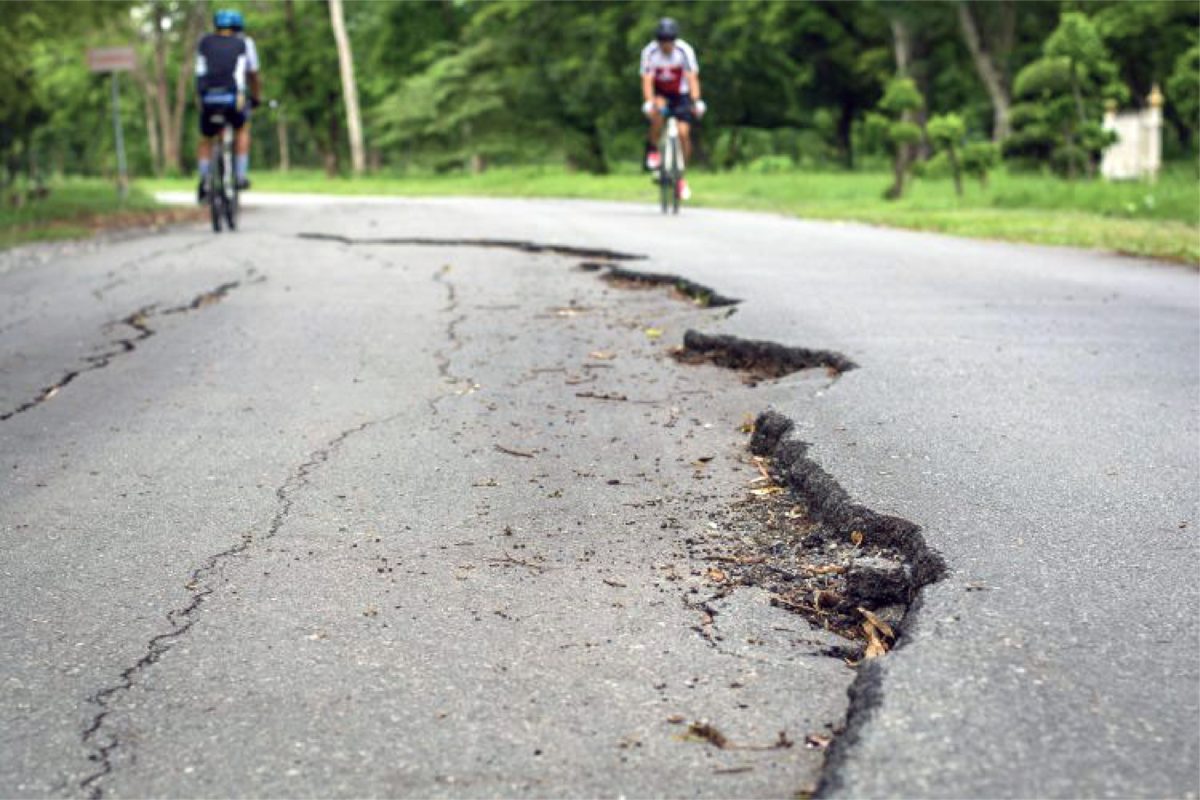In 2016, we ran a blog about cycling etiquette – the things you should know if, for example, you’ve just joined a club and are off out on your first group ride. First on the list were ‘hand signals’.
“Point out problems with the road such as potholes and damaged drain covers. Make sure you keep your bike steady when doing this. Only point out serious issues and ones you feel you can avoid. Too much pointing can get confusing.”
It’s good advice. However, we now realise that some of you may be struggling to follow our instructions given the dire state of UK roads and the frequency with which many of you will come across potholes.
Local authorities in England are apparently receiving a complaint about potholes every 46 seconds, according to data from a freedom of information request sent to local authorities by the Federation of Small Businesses (FSB).
Some 699,535 potholes and road defects have been reported in the past 12 months, with a combined depth of 28km. Almost £1 billion was spent fixing the surfaces. However, the estimated one-time cost to bring UK roads back into a “reasonable, steady state” is estimated to be £9.79 billion – and rising. This despite the fact that funding for local road maintenance is up almost 20% in 2018/19 with more potholes filled compared to the previous year (1.86 million versus 1.53 million).
Most of this isn’t long-term fixes – it’s patching up holes on ever-restricted budgets, making this a Sisyphean task. Indeed, in June this year, the House of Commons transport committee published their “Filling the gap” report, which focused on local roads funding and maintenance. The influential group of MPs highlighted the “plague of potholes” that are proving a “major headache for everyone” – not least cyclists who fall off.

Department for Transport data shows that the number of cyclists killed or injured due to defective road surface more than tripled between 2005 and 2017. In 2017, there were 107 cyclist casualties where a poor or defective road surface was a contributory factor.
“The safety of other road users, especially cyclists, is seriously compromised,” the committee said. “It is clear to us that the key issue is funding – there is not enough of it and what there is not allocated efficiently or effectively”.
”However, the actual figure is likely to be much, much higher.” According to Department for Transport figures, published after a Parliamentary Question submitted by Cambridge MP, Daniel Zeichner, since 2007, at least 431 cyclists were killed or seriously injured on Britain’s roads.
“Cyclists are running the gauntlet when riding on British roads following a decade of under-investment leading to the poor state they’re currently in,” said Paul Tuohy, CEO at the charity Cycling UK, which runs the “Pothole Watch” campaign. “Potholes aren’t just an expensive nuisance, they are ruining lives.”
Another problem is spotting the defects before they throw a cyclist off their bike. The transport committee found cases of local road inspectors not sufficiently trained, not always picking up defects early enough and not given sufficient guidance to properly assess defects and their impacts on other road users – namely cyclists and pedestrians.
In some areas, new tech is being trialled to help out, including ‘Pothole spotters’. This involves equipping buses and bin lorries with high definition cameras and analytical software to provide images of the road, so repairs can be prioritised. There is also an electric bike being used in one trial so the images can be assessed from a cyclist’s perspective. However, there are only a handful of these trials going on.

FSB also looked at the claims made by road users, and found that a further £1.9 billion was paid out in compensation. Looking at the figures, your best chance of making a successful claim is if you’re in the East Midlands (35% success rate from 60,017 claims)). In Greater London the figure was a measly 4% from 42,106 claims, whilst in the South East it was 15% from 22,396.
Cyclists do appear to receive bigger payouts. In an analysis of claims made over the five-year period between financial years 2013/14 and 2017/18, Cycling UK discovered that the average compensation for a pothole-related incident for a motorist was £340, whereas for a cyclist it was more than £8,800.
In all, 537 cyclists made successful claims in that five-year period – but that is 537 injured cyclists too many. Going cap in hand to government for the £9 billion or so quid is one option – fix the roads first, in other words. But budgets are tight. Another more controversial option is therefore emerging: a small tax on cyclists ring-fenced to repair potholes.
Would you be willing to pay this tax?
Or would you rather abandon the roads altogether and take to the trails? Read our post on how to get into mountain biking here.
Feel free to share your thoughts below.